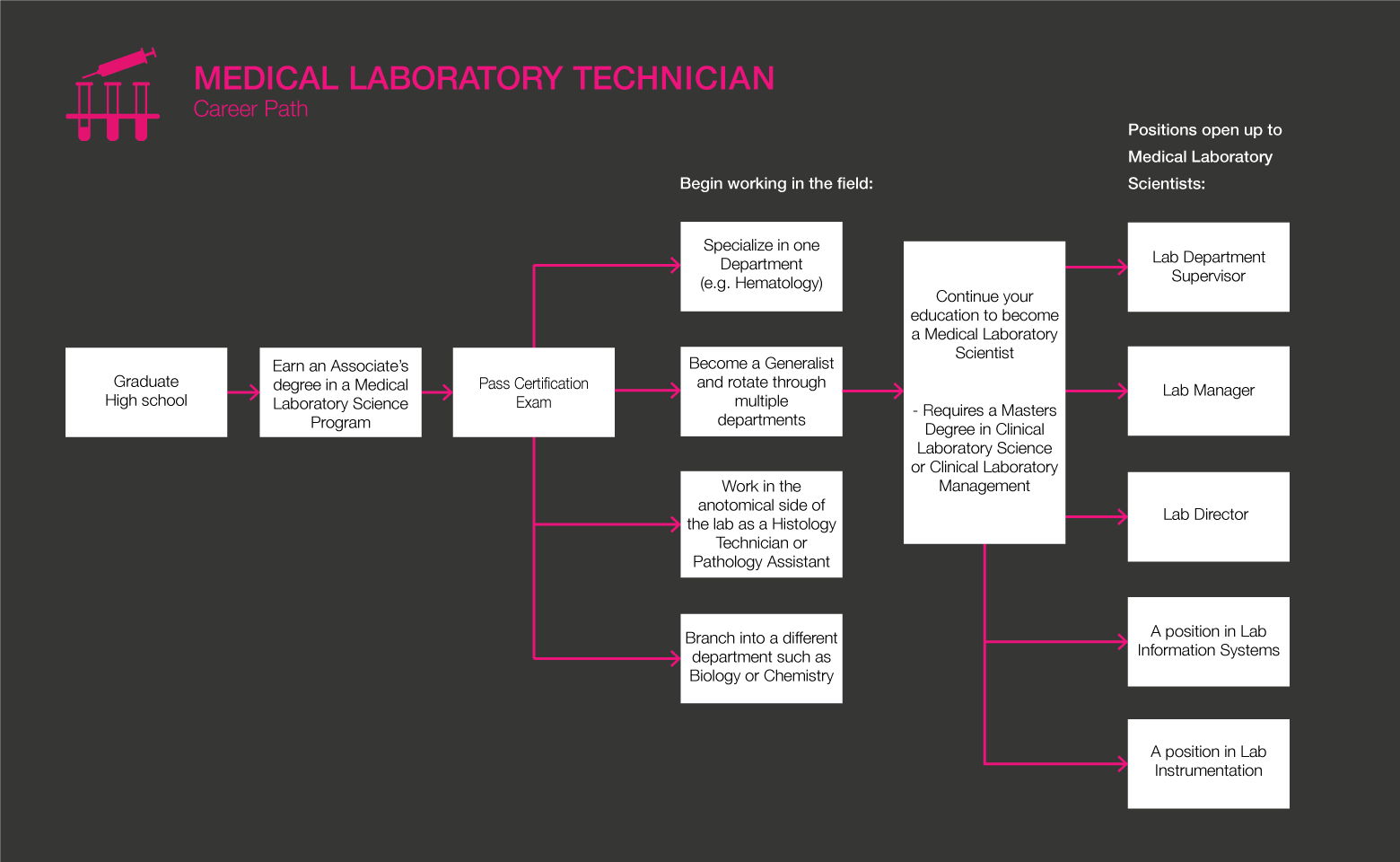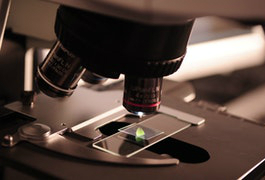Прожекторы
- Clinical Laboratory Technologist
- Clinical Laboratory Technician
- Medical Technician
- Laboratory Assistant
Medical laboratory technicians collect samples and perform tests to examine body fluids, tissue, and other substances. They also analyze results to detect and record abnormalities.
- Helping patients (even without being in direct contact with them)
- Realizing a passion for biology and chemistry by using these disciplines in everyday life
- Low stress person in a lab
- Room to advance to higher positions
- There are four departments in the clinical laboratory to work in: Chemistry, Hematology, Microbiology, and Blood Bank
- In Chemistry, techs analyze the liquid portion of blood and other body fluids (urine, spinal fluid, etc.) to determine if a patient has a disease. Chemistry is the most automated part of the lab, with over 90 percent of the work being done by instruments. The tech's job is to interpret the results that the instrument gives you, and report those results to the patient’s health care provider. This is important for diagnosing diabetes, electrolyte imbalances, infectious diseases like HIV, liver diseases, and many others.
- In Hematology, techs analyze the cellular part of blood and body fluid. They identify and count various types of blood cells, and check them for abnormalities. Around 70 percent of this is done by a machine, where the other 30 percent is done under the microscope. This is how the techs diagnose diseases such as anemia, sickle cell disease, infections, and many others. Coagulation and urinalysis is also generally combined with Hematology.In the coagulation department, techs look at blood clot formations, which is especially important when monitoring blood thinning drugs. When working in urinalysis, techs look at at urine to diagnose urinary tract infections, kidney stones, and other diseases.
- Microbiology deals with the identification of bacteria, fungi, and parasites. It also focuses on selecting the proper antibiotics to treat infections. Micro is about 40 percent automated, with most of the work being done under the microscope or in a biological fume hood.
- Blood Bank is where blood is tested in preparation for transfusion. In blood bank, techs test patient blood and donor blood to make sure that they are compatible with each other. This is a critical department because giving someone the wrong blood can very easily kill them. This department is the least automated, with over 90 percent of the work being done by hand.
- All four departments are critical to diagnosing and providing care for patients
Мягкие навыки
- Active listening and communication
- Критическое мышление
- Detail oriented: instructions for performing tests must be followed exactly
Технические навыки
- Science knowledge
- Billing software
- Medical software: E.g. Electronic medical record EMR software, MEDITECH software, Test result delivery software, Test routing software
- Dexterity: Medical lab technicians must work precisely with needles and other laboratory instruments
- Больница
- Health Clinic
- Health Counselling Service
- Research Laboratory
- Blood Bank
- Balancing time spent at school, with family and friends, and studying for difficult classes
- Keep in mind MLT students have to tackle some of the most technically detailed classes that are offered at an associate's level
Like most medical and scientific fields, Clinical Technicians and Technologists continue to have greater need for computer literacy, including basic coding skills. As specific knowledge about health concerns increases, there is also a greater need for these professionals to narrow their studies into specialties.
- Science and Math activities and experiments.
- Pretending to be a doctor or scientist.
- Helping people who were in trouble.
- Repetitive tasks
- Medical Lab Technicians need at least an associate’s degree or postsecondary certification in Clinical Laboratory Science from a community college or vocational/technical school. Programs should provide practical, hands-on clinical training
- Some students go on to complete a bachelor’s in medical lab technology (aka medical lab science) or a related field. This makes job seekers more competitive and can potentially qualify them for higher-paying positions
- Common bachelor-level courses include:
- Биология
- Chemistry
- Laboratory skills
- Math
- Microbiology
- Safety
- Statistics
- Depending on the state, Medical Lab Technicians may need to be licensed. State health departments, state occupational licensing boards, and the American Society for Clinical Laboratory Science feature details on specific state licensure requirements
- There are many certifications available, such as:
- AAB - Board of Registry - Medical Laboratory Technician Generalist Certification
- American Board of Bioanalysis - Embryology Laboratory Director
- American Medical Technologists - Medical Laboratory Assistant
- American Society for Clinical Pathology -
- Histotechnician
- Medical Laboratory Assistant
- Medical Laboratory Technician
- Pathologist Assistant
- Qualification in Laboratory Safety
- Specialist in Cytometry
- Board of Nephrology Examiners Technology Nursing - Certified Hemodialysis Technologist/Technician
- Drug & Alcohol Testing Industry Association - Certified Professional Collector Trainer
- Nephrology Nursing Certification - Certified Clinical Hemodialysis Technician
- Nuclear Medicine Technology Certification Board - Nuclear Cardiology Technologist
- Organization for Transplant Professionals - Certified Procurement Transplant Coordinator
-
Bachelor's degrees allow lab technicians to be promoted to the position of a medical laboratory scientist, who do many of the same jobs, but have higher interpretation responsibilities
- Take as many biology and chemistry courses as possible
- Think hard about whether you want to pursue a certificate, associate, or bachelor’s degree. The more education you have, the higher your long-term earnings potential. However, knocking out a cert or associate will let students get started working sooner. A bachelor’s can always be later after gaining some work experience
- Read up on the differences between Medical Lab Technicians, Technologists, and Scientists
- Volunteer with local healthcare-related community organizations
- Apply for healthcare internships to build up your resume. Try to learn how to use applicable software related to the job, such as lab information systems, electronic medical records, MEDITECH, test routing programs, etc.
- Review job ads well in advance, to see what qualifications they’re looking for so you can tailor your studies accordingly

- Many medical lab technicians will be hired while performing their clinical rotation, toward the end of course work. Clinical rotations involve going to a laboratory in a hospital or reference lab and learning the technical skills that go along with the theory learned in class
- Hospitals often accept a number of students for clinical rotations equal to the number of positions they have available, with the hope that by training those students, they will eventually gain them as well trained employees
- Talk to your school’s career center or your program’s academic advisor for help finding opportunities
- Check out Medical Lab Technician resume templates for ideas on formatting and phrasing
- Review sample Medical Lab Technician interview questions, then practice mock interviewing so you’ll come across as confident and well-prepared
- Keep up with current laboratory science breakthroughs and instrumentation while you search for jobs. It may impress employers during interviews that you’re staying up-to-date
- Remember to dress for interview success!
- Critical thinking skills
- Great work ethic
- The drive to learn continuously throughout your career, as medical lab technicians will be expected to keep up to date on current laboratory science breakthroughs and instrumentation
-
One of the great things about the laboratory field is that instructors of MLT programs have at some point worked in the field. This gives them insight into how the field works outside of a school setting and makes them excellent mentors.
Сайты
- AABB
- Academy of Clinical Laboratory Physicians and Scientists
- American Association of Bioanalysts
- American Medical Technologists
- American Society for Clinical Pathology
- American Society of Cytopathology
- Clinical Laboratory Management Association
- College of American Pathologists
- Coordinating Council on the Clinical Laboratory Workforce
- National Accrediting Agency for Clinical Laboratory Sciences
Книги
- A Manual of Medical Laboratory Technology, by Arvind H Patel
- Basic Skills in Interpreting Laboratory Data, by American Society of Health-System Pharmacists
- Lab Values Interpretation, by Nurse Academy
- It is possible to move from the clinical side of the lab to the anatomical side, if a tech works in a lab that provides for both. Anatomical pathology looks at diagnosing disease from tissue samples and other sources not covered in the clinical lab.
- The general science background possessed by all MLTs also allows for an easy transition to another medical, or even life science, field
Being a Clinical Technician is an important part of the medical field. You will be able to work with physicians and nurses helping to solve medical problems. It is a great alternative career for someone who does not want to spend the time becoming a Medical Doctor, or spend the long shift hours required of a nurse.
It is a career you can start with an associate’s degree. This will help you gain quick employment which can support further education if you want to become a Technologist. Be sure to check your state’s requirements – currently, only twelve states require technicians and technologists be licensed.
If you are still in high school, you may have access to a Vocational school program. This will allow you to start your career as a Technician much more quickly. If you are better at learning on the job, obtaining a Vocational Certification or an Associate’s degree will have you working and learning this way more quickly.
Лента новостей

Популярные вакансии

Онлайн-курсы и инструменты









